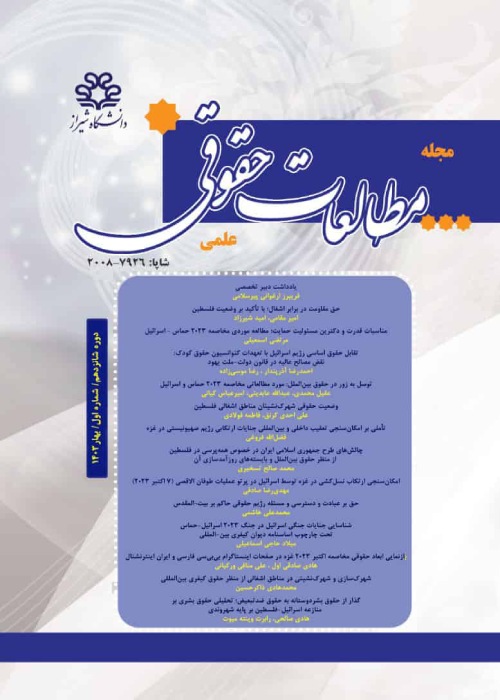Revisiting the Relationship between Law and Morality through the Lens of Natural Law Jurisprudence
Author(s):
Article Type:
Research/Original Article (دارای رتبه معتبر)
Abstract:
The evolution of natural law within jurisprudence has profoundly shaped legal philosophies throughout history. Its foundations intertwine theology, religious ethics, and the belief in fixed, eternal laws governing the world's nature, rooted in divine order. The origins of natural rights can be traced back to the Stoics, whose philosophy emphasized the intrinsic relationship between nature, reason, and law.Early proponents of natural law, influential until the 18th century, contested the credibility of man-made laws, advocating for objective limitations on sovereign lawmaking. They asserted that man-made laws ought to align with natural law, grounded in reason. However, societal progression prompted a shift, acknowledging the necessity of man-made laws.In the modern era, the rise of positivism and the belief in the separation of law and ethics posed challenges to traditional natural law theory. Some thinkers contended that despite these changes, natural law could still address modern ethical needs by modifying classical perspectives.John Stuart Mill's "On Liberty" in 1859 introduced the Harm principle, challenging the government's role in morality enforcement. Subsequently, James Fitzjames Stephen opposed this notion in "Liberty, Equality and Fraternity" in 1873. The 20th-centur y "Wolfenden Committee" report to the British House of Representatives triggered debates such as the "Hart and Devlin" debate, centering on the principle of harm, becoming pivotal in Anglo-American legal philosophy and across legal systems globally.This article aims to assess the relationship between law and morality within the context of natural law jurisprudence. It contends that while classical natural law comprehension may be inadequate, a rational understanding of legal ethics can withstand positivist criticisms. Moreover, it argues that modern natural law, despite its theoretical advancements, faces practical challenges. Notably, references will be drawn from prominent natural law thinkers such as LON Fuller, Mark Murphy, John Finnis, and Robert George.An essential conclusion drawn from these evaluations is the centrality of reason in moral legislation. While classical natural law emphasized the superiority of morality over law, modern natural law theories focus on the formal conditions of legal morality, relying on formal, rational, and verifiable criteria.The transformation also extends to the approach toward law and ethics, altering the concept of duty towards unjust norms and leading to changing standards of legal morality. Furthermore, the origins of legal validity have shifted from moral principles rooted in broader maxims to the predominance of reason and rationality in legitimizing political and legal orders.
Keywords:
Language:
Persian
Published:
Legal Studies, Volume:15 Issue: 4, 2024
Pages:
35 to 63
https://magiran.com/p2665383
دانلود و مطالعه متن این مقاله با یکی از روشهای زیر امکان پذیر است:
اشتراک شخصی
با عضویت و پرداخت آنلاین حق اشتراک یکساله به مبلغ 1,390,000ريال میتوانید 70 عنوان مطلب دانلود کنید!
اشتراک سازمانی
به کتابخانه دانشگاه یا محل کار خود پیشنهاد کنید تا اشتراک سازمانی این پایگاه را برای دسترسی نامحدود همه کاربران به متن مطالب تهیه نمایند!
توجه!
- حق عضویت دریافتی صرف حمایت از نشریات عضو و نگهداری، تکمیل و توسعه مگیران میشود.
- پرداخت حق اشتراک و دانلود مقالات اجازه بازنشر آن در سایر رسانههای چاپی و دیجیتال را به کاربر نمیدهد.
In order to view content subscription is required
Personal subscription
Subscribe magiran.com for 70 € euros via PayPal and download 70 articles during a year.
Organization subscription
Please contact us to subscribe your university or library for unlimited access!


